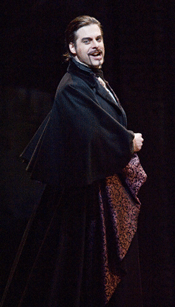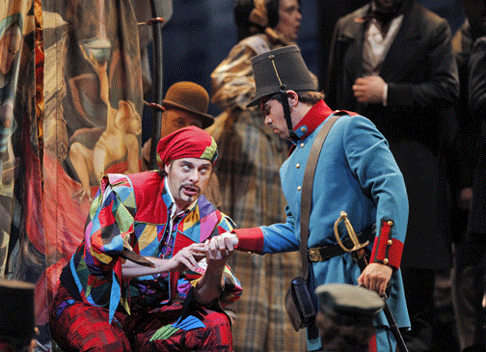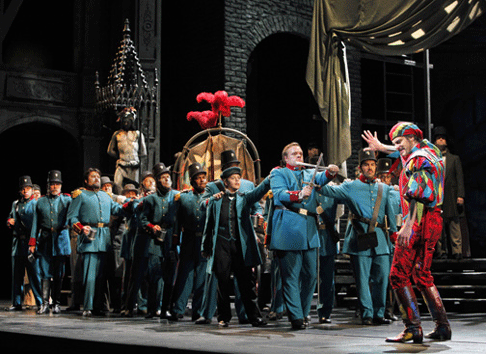The operatic culture at San Francisco Opera is quite Italian these days, explaining maybe why for this montage of Gounod’s 1859 masterpiece the baton was passed to Italian conductor Maurizio Benini and its leading role was entrusted to fine Italian tenor Stefano Secco.
We might have been tempted to think of it as an Italianate montage except that all but one of the rest of its cast were graduates of SFO’s estimable young artist stable, the Adler Fellows, most notably the divissima Patricia Racette as a touching Marguerite, and not too far behind John Relyea as an ultra debonair MÈphistophÈlËs. Not to mention soprano Daniela Mack as a right-on SiÈbel.
 John Relyea as MÈphistophÈlËs [Photo by Terrence McCarthy courtesy of San Francisco Opera]
John Relyea as MÈphistophÈlËs [Photo by Terrence McCarthy courtesy of San Francisco Opera]
The Adler Fellows is the justifiable pride of San Francisco Opera. Young singers arrive and are transformed into young artists many of whom eventually or even quickly become big stars with extraordinary dimension — well schooled fine voices and well schooled stage comportment. If you were a stage director these artists could be the colleagues of your dreams. And, uhm, MÈphistophÈlËs arrived at the fair (Kermesse) like Pagliacci (in harlequin garb) in his pornography wagon, Marguerite sang her spinning song while operating a huge loom in an eighteenth or some other century sweatshop. Just when you thought Faust was about pretty music it turned out to be about stage business. Mr. Condemi did indeed have many ideas that the singers worked too hard to implement. We soon tired of all those ideas and from all that work and just wanted to hear Gounod’s beautiful music.
The production (sets and costumes) for this Faust montage came from the San Francisco Opera warehouse where it has been sequestered for fifteen years. The program booklet did not identify an original director, though the scenery and costumes were attributed to Robert Perdziola a veteran of several SFO productions during the Mansouri years. It was a meant-to-be dreary, towering unit set, its painted backdrop even more dreary architecture, scenery reminiscent of all the mistaken reasons Faust is considered a dated old piece that does not resonate with current sensibilities.
Staging of this revival was entrusted to yet another former Adler Fellow (the Adler Fellows occasionally include the odd stage director as well as the usual singers). Argentine born and trained Jose Maria Condemi did his best to make something of all this — like making Faust who we always thought was a philosopher into an anatomy professor. The opera began with four corpses on the stage awaiting dissection, Faust about to become a fifth corpse. But suddenly one of the corpses arose as MÈphistophÈlËs who saved the day.
Wagner, current Adler Fellow Austin Kness, was not a student but a soldier, later brought back from battle on a stretcher where, wept upon by his mother, he expired during the rousingly famous Soldiers’ Chorus, meanwhile Valentin, Juilliard trained Brian Mulligan as commanding officer presented flags to distraught wives and mothers of the soldiers who did not return.
 John Relyea as MÈphistophÈlËs and Austin Kness as Wagner [Photo by Cory Weaver courtesy of San Francisco Opera]
John Relyea as MÈphistophÈlËs and Austin Kness as Wagner [Photo by Cory Weaver courtesy of San Francisco Opera]
But that we did not. Conductor Benini took turgid tempos, confusing Faust’s inherently pretty sentimentalism with hard-hitting verismo. Tenor Stefano Secco, a sensitive actor, did have some very fine moments of quite beautiful singing, never quite suppressing a hint of squillo or the sense that a tenorial sob was out of the question. Mr. Mulligan, the Valentin, quickly created his character in his Avant de quitter as an insensitive, volatile, big voiced personality who had not quite mastered the strut and lurch school of acting. Mme. Racette indulged us with some thrilling diva singing though her persona conveyed heroic distress more than Marguerite’s innocent madness.
The Saturday night audience, the opening night of the spring season, was out for a good time and judging from the applause MÈphistophÈlËs succeeded best in making it fun. Bass Baritone John Relyea dominated the stage with a commanding presence, a forceful voice, and lots of colorful costumes. The staging however deprived him of all possibility to exploit the sometimes diabolically sublime music Gounod gave him, in particular his here sarcastic delivery of the meltingly beautiful invocation to darkness ‘ nuit, Ètends sur eux ton ombre.
 Brian Mulligan as Valentin and John Relyea as MÈphistophÈlËs [Photo by Cory Weaver courtesy of San Francisco Opera]
Brian Mulligan as Valentin and John Relyea as MÈphistophÈlËs [Photo by Cory Weaver courtesy of San Francisco Opera]
The name of the opera is Faust though it is all about Marguerite who has the great showpiece arias plus the sometimes spine-tingling ascension. But Faust gets the last bow anyway. Though his cad-like behavior on stage had not endeared him to the audience Mr. Secco gracefully accepted his less enthusiastic ovation, knowing that he had made a successful debut in a role that will serve him well in international circles.
Lighting designer Duane Schuler did not take an opening night bow. Mr. Schuler most recently lighted the Peter Stein Tchaikowsky trilogy in Lyon, moving from the sublime to the ridiculous.
Michael Milenski
image=http://www.operatoday.com/RacSec_CW.gif
image_description=Patricia Racette (Marguerite) and Sefano Secco (Faust) [Photo by Cory Weaver courtesy of San Francisco Opera]
product=yes
product_title=Charles Gounod: Faust
product_by=Faust: Stefano Secco; Marguerite: Patricia Racette; MÈphistophÈlËs: John Relyea; Valentin: Brian Mulligan; Siebel: Daniela Mack; Marthe: Catherine Cook; Wagner: Austin Kness. Conductor: Maurizio Benini. Director: Jose Maria Condemi. Production Designer: Robert Perdziola. Lighting Designer: Duane Schuler. Choreographer: Lawrence Pech.
product_id=Above: Patricia Racette (Marguerite) and Sefano Secco (Faust) [Photo by Cory Weaver courtesy of San Francisco Opera]